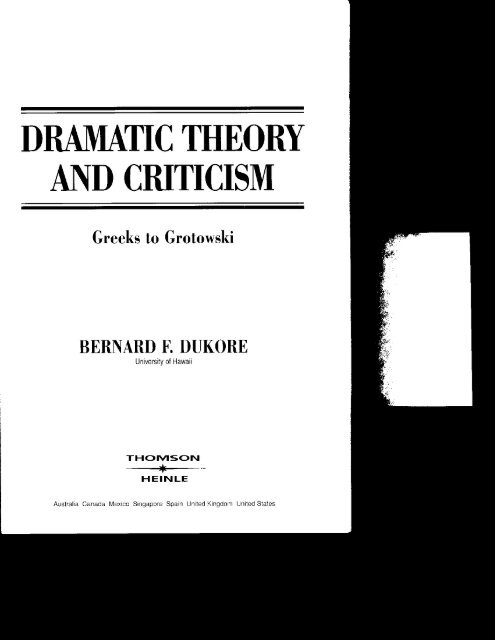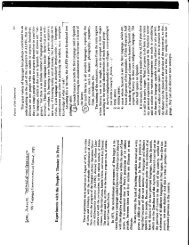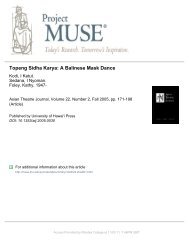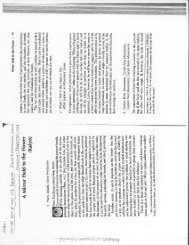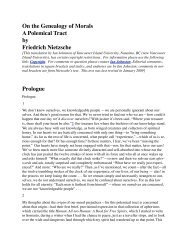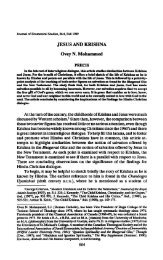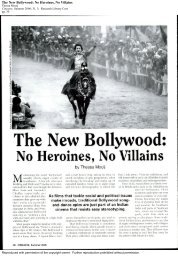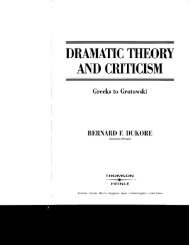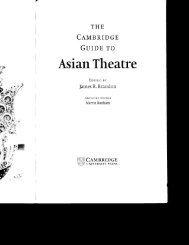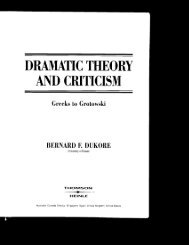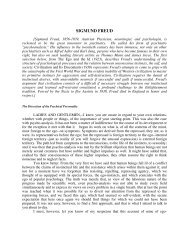Corneille - Yavanika
Corneille - Yavanika
Corneille - Yavanika
- No tags were found...
Create successful ePaper yourself
Turn your PDF publications into a flip-book with our unique Google optimized e-Paper software.
DRA1VIATIC THEORYND CRITICISMGreeks to GrotowskiBBRNARD F. DUKOREUniversity ol Hawaii-rHorvtsoN-----+---HEINLEAuslralia Canada Mexico Singapore Span United Kingdom United Slates
f ierre <strong>Corneille</strong> 227ptgt€!,- and that until norv those u,ho have volurteered to act as such havcoftcn interpreted tlrcse lriters only for the bencfit of grammarians andphilosophcrs. As tho,rvcrc more scholarll' and theoretical than experiencedin the theatre, thcir scholarship uas able to makc us ruore erudite, but notiyc us rnuch real insight iuto horv to sncceed in the theatre.I will vc.n hr rd-s oriEth i--g ing dfrft)' ur-i€a's G "-o* ior iii the stage, and rvillspeak nr, thoughts about it quite simply, rvitlrout the spirit of contest whichconpels rlc to affirm them, and without intending that anybody renounccin nv favor those that hc u,ill haye couccived.'lhus, what I assertcd at the beginning of this discourse-that dramaticpoetrl has for its end soleh to please thc spcctators is not for the purposeof stubbornlv getting thc bettcr of those *]ro think to ennoble the art bygiving it for its object usefulncss as uell as plcasurc. Such a dispute rvouldbe cluitc uselcss since it is inpossiblc to please according to thc rules lithoutat the sane tinrc providing a great deal of uscfulncss. It is true thatAristotlc, in the rvlrolc of his Pr-retics, ncver usecl this u,ord oncc; that hcattributcd thc origin of the drama to thc plcasure that \\'e take in srringthe actions of rncn initatcd; th:rt he prefcrred tlrat part of thc play rvhichdealt $'ith the plot to that u'hich dcalt rvith the characterizatioDs, becausethc former contained what was ntost pleasirlg, likc rccognitions ancl reversals;that he includcd in the definition of tragcdv the pleasing clualitv of thclanguage of utich it is corrrposecl; and that, finallv, hc estccmed it morehighlv than the epic poem bccausc it has nore spectaclc and nlusic (\hicharc porverful plcasurcs), and because, sincc it is shorter and lcss diffuse,thc plcasure that one takes in it is norc perfect. But it is not lcss tmc thatHorace teaches us lc u,ill not be ablc to pleasc evcrvonc if rve do not blendin sonc useful things irnd that gravc and scrious uren, old men, lovers ofvirtuc u,ill bc bored if tho find nothing fron nhich to pro6t: "CenturiaeseniortLn'L dgitdnt expertid frugis."l Thus, although the usefulncss cnters onlvin thc guise of the delightful, it is no lcss nccessary (ancl it is nore profitable)to exanrine rvhat placc rvc should assign to it thaD to disputc, as I saidbcfore, a uselcss question regarding use in this sort of poetn. I think, then,tliat it is possiblc to mcct u ith four kincls of use.The first consists in nraxirus and noral instructions that are stre$nalmost cvcrvuherc; but thcv rnust be used moderately and rarcly, put intogcneral conversation or evcn rrore than uttcrcd, especially u'hen one nakesa passionatc nan spcirk or be in slnpathv rvith anothcr lr,ho spcaks to him;for he should have neither the patience to listen nor the easv mind toconceiye and to sav them. . . .The second use in the dramatic poem lies in the simple painting ofl "Flkler folk rail at what contails no serviccable lesson.Poet'y, p. 71)."(see above, Art ol
228 Seyenteenth-and.Eightecnth-Century Frcncevices and virtues, which never fails to make its effcct rvhen it is rvellachieved and when the traits are so rccognizablc that one cannot confusethem u,ith each other, nor take rice foi rirtuc. \,irtue is alwavs to belovcd, though unhappy; and vice is alu'a1,.s to be hated, though triumphant.The ancients arc often quiie happy rvith this depiction u,ithout taking thetrouble to have good deeds rcconpensed and bad ones punished. Clt,tentrrcslrarnd lrcr lorcr krll Agarrrcrrinon with irnprrnitr. \ledea does arra\'rvith her children and Atreus with thosc of his brothcr, Thlcstcs, anjrnakes 1'hyestes eat thern. It is truc that closc consideration of the actionswhich thev chose for the catastrophes of their tragedies shorvs that thoscthey had punishcd uere crininals, but the,, ucre punished by crines grcatcrthan their owrr. Thvcstcs had abusecl his brother's u,ife but the vengeanccthat Atrcus takes for it is sotnervhat nore horrible than the first crimc. Jasonwas perfidious to abandon NJetlea, to tvhon he owed all: but to rnurderhis chilclren under his ven eles is solncthing clse again. Clvtemnestra coruplainedof the concubires that Agamenuon brought hon.rc from Trov; buthe had not made a criminal attempt on her life as she did on his. and thesemasters of the art found the crinre of his son, C)rcstes, sho killed to avcDgehis father, still greater than hers since thcr, gave Orcstes the avengrngFuries to tornent him and did not give thcn to his mother, who is allorvcdto cnjov pcaceably, rlith hcr Aegisthu, thc kingdom of a husband shchas murdered.Our thcatre tolcrates such subjccts u,ith difficultv: thc Thyestes of Senecawas not very successful; bis Medea found ntore favor; but also, to be perfcctlvclear, ihe perfidv of Jason and the violence of the king of Corinthmake hcr seem so unjustlv opprcsscd that the spcttator easiiv sides rvithher and regards her vengeance as justice, l{rich she performs herself onllrosc rr lro opprerr her.It is this interest that llc love to take in the virtuous that has constrainedus to ardve at this other manner of finishing the dranatic poem-bv thepttntsltnrcnt of rril ects and tlte rtuardirrg ot eood un"r-,,ui,ial, i, ,,ot "rule of the art, but a usagc u,hich r,. hai. err,-rbrac.d, frour rrhich evcrvmrrr car devirle a t lrir ou n pc ril. . ..It is in this that the third use in thc thcatle consists, as the fourth liesin the purging of cnotions bv means of pitv and terror. But as tlris use ispeculiar to tragedv I will expound on this subject in the second volume. . . .lAristotle says] that the difference bctween these tu,o kinds of plavs [comedyand tragcdy] consists onlv in thc nobilit\,of the characters and of the actionsthat thev imitate and not in thc narlrer of irritating them. nor in thcmelns rrhiclr
Pierre <strong>Corneille</strong> 229this definition does not satisfl' me; and since nrany uise men hold thatAristotle's Poetics has not come dour to r.rs iD its entiretr, I rvish to believethat in the vcrsion of which time has robbed us- there lvould bc a morecomplctc dcfinition.Dramatic poetrv, according to Aristotle, is an irnitation of actions andhe stops short lt the condition of the pcrsons. without saying what theseactions should bc. Ilowever that nav be, this definition is in accord rviththe usage of his times where only persons in a noderate condition of lifewere macle to speak in colnedt; but it is not entirell precise for ours, wherekings thenselves can come on in comedv rvhen their actions are not aboveit. \\/hen onc puts on the stagc a simple intrigue of love betu'een kings.and uten thev irlperil neither their lives nor their states, I do not believethat, although the characters are illustrious, the action should be elevatedto the level of tragedv. Its dignitv derrranclsorre grcat interest of state orsone passion rrorc noble and virilc than lovc, such as ambition or vengcance,and it sliould lead ns to fear greater misfortune than the loss of a mistress. r.,It is proper to interuringle love uith tragech, bccarrsc it is ahvavs so pleasur- ''ablc ancl can servc as thc foundation for these concerns and these otherpassions of which I speak; but it rrust als,avs bc content uith the sccondlevel of the play and leave the first to the others.This maxim rvill secn ncx at first; but it is ahlavs the practice of theancients, in uhom n'e see no tragedl uhere there is siurply a love interestto clear up. C)n the contrarv, thel often did awal u,ith it completelv: andthose rvho wish to consider mr, plars n'ill adrnit that, at thcir example, Ihave never allorved it to assune the most inportaDt place, and that inThe Cid itself ,'"vhich is undoubtedlv nore full of love than m,v other plavs,obligation of birth and pride of honor carrv it above all the endearmentsthat lovc inspires in thc plar"s lovers. . . .Second DiscourseOnTragedy and the Means ol Treating Itaccording to the Probable or the NecessaryAsidc fron the three uses in the drarnatic poen of u'hich I have spokcnin the discourse rvhich sen'es as the preface to the first part of this collection,tragedv has this special one, that "through pitl and terror it purges us ofthese same cmotions." 'lhese are the tcrms which Aristotlc uses in hisdefinition and they inform us of tuo things: one, that tragedy excites pitvand terror; trvo, that b1. ncans of pity and terror, it purges these samcemotions. Aristotlc cxplains the first at som€ lcngth, but he does not sayonc word about the second, and, of all the terms that he uses in this definition, purgation is the only one that he does not clarify. . . .
210 Seyenteenth- and llightecnth-Ccilur y- Irdnce"We "those pitv," sa\,s he, li'hon r",'c scc suffer a rrisfortune thai theydo not deserve, and ue fear that a like fate rvill come to us when u'c seernen like ourselves suffer." '1hus, pitl enrbraces concern for thc pcrson ucsee suffering; terror, rvhich folloss upon it, concens orrr orvn; and this"following uporr," alone, givcs us enough rneaDs to find thc narrncr rnwhich the enotions arc purgcd in tragcdy. Pitv for a rrisfortunc into lhichwc scc urcn like ourselves frll trkcs ns to terror of a like one for oursclvcs;this terror to thc dcsirc to avoid it; this clcsirc to the rvish to purgc, tomoderate, to rectifv, even to eradicatc in oursclves thc enotio I'hich,beforc our cycs, plunges persous that te pitt into misfortunc; for thisordinarr, but natural ancl indubitable rcason: that to ar,oid tlre cffcct onenust cut out thc causc. . . . It is t.uc that, ordinarilv, onlr' kings are prescnted as the principal charactcrs in a trageth' and tlrat thc spcctatorshold ro sccptrcs as thev clo to givc thenr goocl reason to fe:rr the urisfortuucrvhich befalls thcsc kings; bLrt thesc kings are rlen like the spcctators andfall into nrisfortune bccausc of transports of passion of uhich thc spectatorsare capablc. 'lhcv themsclres present easilv comprehensible evidence of afall frorn the greatest to the lcast; tlre arrclienccan casilv coruprehend thatif a king, bv abandoning hirrsclf so courplcteh' to arrbitior], to lo\,c, tohate, to vcngernce, falls into rlisforturrc so great that thc auclicnce pitieshiur. there is much morc ncccssitl for onc qto is onh a cornlron lrran tobridle such enotions for fear that thur rrill hrrrl hinr into uqrrrl misfortune.Outside of that it is not nccessirl that tlie theatre onlr, shou thc rnisfortunesof kings. The nrisfortune of othcr ruen coLrld takc placc thcrc if it bcfcllany rvho u'crc illustrous ancl ertraortlinarl cnough to nerit it and if historvcarcd enougl] lbout then to tcach us.. . .'lb facilitatc for Lrs the means of engenclcring this pitr, and terror to uhichAristotle scerns to courpel us, he lrelps us to choosc pcople and cvcnts uhichcan cxcitc onc or the othcr. Conccrning shich I grant ulrat is r,ery true,that our audience is courposcd ncitlrcr of sickecl rnen nor of s:rints, but ofpcoplc of orclinarl intcgriti, uho arc not so scvcrclv cntrcnchcd in absolutcvirtue that thcr uoulcl not bc susccptible to erlrotions aud c:rpable offalling into dangcrs lhiclr cngirgc those uho submit to tlrcm too ruuch.'fhat being grantccl, lct us cx:rnrinc thc.rsc rl'honr tlie plrilosopher excludcsfrom tragccll in orcler to arrile, rvith lriur, at thosc in rton hc bclicvcspcrfcctiorr to consist.In the first place he does rlot \\'!rnt a "corupleteh virtuous man to passfrom prospcritv into aclvcrsitr'," and hc rnaintains that "that produces neitherpitv nor terror because it is a conrplcich unjust occurrcncc." Sonrc interpretersemphasize the Greck \\'ord, pr"p,ir,, uhich he uses as ar epitliet for this occurrcnce,eveo to translating it "aboninable." 'I'o shich I add that suclr apassagc c\citcs morc intlignatiol artl hirtrc
Pierte <strong>Corneille</strong>lltnot propcr to tragedr', at lcast to rlell contrive
-'*i- i i.{t}'|n'""], ,,r)(.'r{t'li\'-r IY.7L232 Seventeenth- and Erght, cnth-Ccntury Fnnceit The Cid and they caused its great success. Rodrigue and Chimdne havethis virtue; it is exposed to passions; and their passions cause their misfortune,although they are unfortunate onlv insofar as thev are in agonvover each other. They fall into adversity through human frailty, of rvhichwe like they are capable; their adversity invariablv causes pit,v, and it hascost thc spectators enough tears not to arguc the point at all. 'lliis pitvought to give us the fear of falling into like adversity and purge in us thisexcess of lovc which causes thcir advcrsitr and makcs us pitv thcm. But ido not Lnon if it giver u\ tcuor ror or if it purges prrrge: it, it. and I_g9g![fear Ill]9tthcllrir Uoirrt is onlr a beruljful idea rrlricb innevcr has this t t.arr-li1d tlo;crvf,irs]I'll=r Sifr pioductions ocluct irrn s ofmav look into their secret hearts and think over again whatnovcd them in thc theatre to find out if thcy came thus to this reflcxiyeterror, and if it rectified in thern the passiorl \\.hich caused the disgracethat they fcared. . . . If the conditions that Aristotle clenands are neccssarvto produce tragedl, thcy arc cncountcrcd so rarcly that Robortcllus finclsthem onlv in the Oediprrs and uraintains that thc philosophcr does notprescribe them to us as so ncccssarv that thcir abscncc rcndcrs a uorkdcfcctivc cxcept as idcas rcgarding the perfection of tragcclr'. Our centurvsarv them in The Cid, but I clo not knou if it sau' thcm in manv others;and if u'c u'ish to cast another ghuce at this rule ue will confess that thcirsuccess justified nanr,plals uhere it uas not obsen'ed.T'he exclusion of perfectlr virtuous persons uho fall into adversitvbanishcs martr'rs fron our t\eatrc. Po|yetLc:te succceded contrarv to thismaxin and Ileratlius and Niconrdde! pleased (alihough thev imprinteclonll pitl on us and did not givc us anvthing to fcar nor arrv p:rssion topurgc), even though rve se€ tlern3 oppressed ancl on tlrc point of perishinguithout anv fault on thcir part l'lrich rrc oursc]\'es uright be able to correcton the basis of thcir exaurples.'l'he advcrsitv of a courplctch bacl urirn cxcitcs neither pit\ nor terror,becausc it is not uortlrv of thc formcr anil bccansc thc audicncc, lho unlikchim is not uickccl, cirnnot corrccivc terror:rt thc sight of his punislrrnent.Ilut it rvould bc fitting to rrake some distinction among crimes. Therc aresonrc, of rvhich honcst pcoplc rrc caplble tlirough an excess of passion,thc cr,il success of uhich can havc an ciTcct on the sonl of the spcctator.-An honcst rnan ilill not stcal in a dark corner of thc ii'oods, nor comrrita nurdcr in cold blood; but if he is clecplv in lovc he can hoodljnk hjsrival, he crtn flr into .r fit ,'f anqcr ancl kill in a singlc movcncnt, andarrbition can cntanglc lrim iu a crine or a blarncrrortll action. . . .I Ali rre bv Corncillc.:r'1Lctitlc char.rctcrs.Nevertheless, whateveand palpable purgation oeasv to reconcile ourselvrvav of rvording it, he didtogether, and that it suftthe catharsis, with this dterror and terror cannot hacause cithcr in The Cid agance that is envious ofue fcel for Rodrigue an
Pierrc <strong>Corneille</strong>2t1Nevertheless, rvhatcver difficultv there might be in finding this effcctiveand palpable purgation of the emotioDs bv merns of pity and terror, it iseasr, to reconcile ourselves uith Aristotlc. Wc have only to say tlrat by thisrvav of rvording it, hc did not mean that these trvo nrethods always attendedtogethcr, and that it suffices, according to him, for onc of the trvo to effcctthe catharsis, rvith this difference horvever, that pity cannot occur withoutterror and terror carrnot happcn rvithout pitv. The death of the Count does notcause eithcr h The Cid and it can still bcttcr purgc us of thc sort of arrogancethat is envious of the glorv of others, thaD all thc compassion thatuc fcel for Rodriguc and Chirrdnc purges the sentiments of that violentlove rvhich nakes thern both objects of pitr'. . . .To surn up this cliscoursc beforc noving to another ntatter, let us establishas a maxim that the perfection of tragcdv bcst consists in cxciting pitland tcrror bv means of a principal clraractcr, as Rodrigue is able to functionin T/re Cid and Placiclc rn Thiodorc, but that that is not so absolutcl_vnecessary that onc callnot make usc of diffcrcnt pcrsons to cngender thesecrnotions, as ir Rodogu?re,t ancl evcn to rllove tlie listener to one of thetn,o, as in Polyeucte, u'hose perfonrancc is nrar'kcd onil bv pit1, r,ithoutanv tcrror. That being set doru, let us find some mitigatiorr to the rigiditt'of thc philosopher's rules, or at least sonlc favorable interprctation, sn JSnot to be obligcd to condelrn some plavs that le have secn succeed inour thcatres.Aristotlc docs rrot \\ant a conrplctch good rran to fall into advcrsitvbcrurrrc. llral bcirre rl,,,rrrinahlc. it .',cltci' rrrore rndrgrrrlion rrglinsl llrcone uho persccutcs hirn than pitv for his misfortunc. Ncitlrcr clocs hc $,arta corrplctclv bad nran to fall, kcansc unl- lillr,,t fcrl pitr for I rnisfortnnethat he deserves or cngcnclcr tcrror of a likc misfortunc anong spectatorshc docs not rcscmble; but uten thcsc tu,o rc:tsons are not present, so thata good man u,ho suffcrs cxcites nrorc pitr'{or himsclf than indignation agrinstthe one u,ho rnaclc hin suffer. or thc punishrlent of a great crrnle caDcorrect in us sonrc irrPerfection rvhich has soncthing in comnon rvith it,I believc that it is not ncccssan, to raise obstacles to shosing on the stageverr good or r,erl batl nrcn in advcrsitr'. . .r1.lThe cncl of thc poct is to plcasc accorcling to the rules of his art. ln ,a7lordcr to plcasc. he sourctinres riecds to hcightcrr thc brilliancc of beautiful 21 1actions and to c\tcnuatc thc horror of fatal oncs.'lhese are sonre necessitiesof errtbellislrurent rvith rrhich hc rrar grcath shock particular probabilitvbv sornc litcratiol of histon but rlot so as to cxernpt hiurself fronr qcneralprobabilitt, exccpt rareir', .rnil for things that mat bc of rrtmost bcarrtr, andso brilliant tlrat tho dazzlc. Abor.c all, it shoulil nevcr he ncccssarr, tor l\1l plavs cited are bv Corneilie.
214 Seyenteenth- andliightectttltCerLtury Frcncepush them bevond cxtrlordinar\ probabilitv bccause these ornamcnts thatthe poet adds out of his oun inr,ention are not absolutch necessarv, andit is better to dispense with therl conpletclr. than to aclorn his plav contrary to all nanner of probabilitr'. In orcler to pleasc accorcling to the rulesof his art he rnust confinc his action to unitv of tirue and of placc, andas that is an absolLrtc and indispcnsable necessitv. much more leeu:rv isperlnittcd to hirlt in these t$ o itcDrs than in that of enbellishnrent.It is so difficult to cltcounter, in ltiston or in thc iuragination of men,a great nunbcr of tlresc illustrio[s e\,cnts uorthy of tragedt, whoseresolrrtions arrd thcir execution can happen in the sarnc placc andon the sarrc dar, u'ithout cloing a little violcncc to thc usual orclerof things that I canrrot belio,c this sort of violeuce complctcll'condentnable proviclecl it docs uot skirt the iurpossiblc.'l hcre arc beautifulplots uhere onc carlot :rvoid it, and a scrupulous plavuright uilldcprive himsclf of an opportunitv for glon irncl the public of a great clealof satisfaction if hc does rot rnake bold to put therrr on thc stagc, forfcar of sceing hiruself forcccl to makc thcur nlove rrlorc quicklv than prol>abilitv permits hirn to. I lill, in ihis case, give hiur some advicc that heu'ill find salutary: It is that he shoul
Piette <strong>Corneille</strong> 235Third DiscourseOn the Tluee Unitiesof Actiort, of Time, and of Plare) l'\I mailtain, t'hen, and I have alreadv said so, that in comcdy unity ofaction consists in unitr.of intrigue or of obstacle to the designs of theprincipal charactcrs; and in tragcdl', it consists in nnitv of danger, uhetherthe hero perishes in it or escapes from it. I clo not nean that one cannotallol'several dangers in the latter and several intrigries or obstacles in theforn.rer, provided that one necessarilv flous into the other; because thenthe cnd of the first clanger does not render the action conplctc, since itbrings u'ith it a sccond one; ancl the clearing Lrp of one intrigue docs notbring thc actors to a conplcte rcst, sircc it cntangles thcrr in a nerr'o[e. \,lv menrorr,does not pror,ide me anv exarDples in former tincs of tlrisnultiplicitl, of dangers linkcd to each other, so as not to dcstro,v unitv ofaction: but I har,c brandcd as a dcfcct thc nnsubordinatcd clouble action inIloruce and rn'flftodore, u'here there is no need for the forner to kill hissistcr as he sallics forth from his victorr', nor for thc lattcf to offer herselfas a nartvr after having escapecl prostitution; and I am grcatll dcccivcdif the dcaths of Pol,vxcna ancl of Astvanax, in The Troian Wornen ofSencca, do not creatc thc sanrc irrcgularitv.In the second placc, this phrasc "unitv of action" docs not mean that rrithe tragedv should shou onlv one action or the stage. \\'hat the poetchooscs for his subjcct nust havc a bcgirning, a middlc, and an end; andthese thrce parts are not onlv so rnanl actions coning to a head in thenain action. but. further. each of thcsc actions can consist of several actionssimilarlt' subordinated. 'l here must bc onlv one conplete action . butit can cvolve onlv through scvcral othcr incorrplctc actions, which serve asprogressions and keep the spectator in a pleasant state of suspensc.'fhe playwright rrust contrive this suspense at the cnd of €ach act in order to renderthc action continuous. There is no nced to knorv preciselv all that theactors do during thc intcrrrissions, nor u'hat thcy are doing u'hen tlreydo not appear on tlre stagc, but cach act Drust lcavc an expectation ofsomething that uill be shosn in the one that follou's it. . . .'l'he rule of unitv of tirre has its foundation in thc statcncnt of Aristotletlrat "tragcdv rrrust confine the drrration of its action to one revolution ofthc sun or not exceed it bv verv much." These rvords give risc to that famousargumcnt over rvhethcr Aristotlc means a natural dav of twentl four hoursor an artificial dav of tu'elvc.'['here are tu'o yicus. of u,hich cach has severalpartisans; and, as for ne, I find that therc are some subjccts so difficult5 The title characters of the former and latter plavs (both by CorneilJe).
2i6Seycnteenth- and Eightccrtth,Century F ranceto confiDe in so little tinre that not onh clo I lccorcl them thc cntire t$.entr,,four hours. but I r,ill er,cn avail n,rr.if ,f thc hbrrtr that the plrilosophergives of cxccccling thcnr a little, and \\ ill, lithout scruple, extend therrto thirtv hours. . . . I 6ld that a Nriter is ill lt ease under this constraintuhich forced scveral of our ancicnts to skirt the inpossible. . . .Nlanv speak out against this rule tvhich thev call trrannical, ancl thcvu,ould be right if it n,cre lxsecl onlv on thc authoritr of Aristotlc; but\r'hat ought to givc it general acclptance is tlre natural reason thatsupports hinr. A clrirntatic poern is an imitltion, or to cxprcss it better,a portrait of the actions of men; and, s,ithorit cloubt, portraits arc in thesane proportion rnore crccllent as ther nrore closch. rescmblc the original.Tlre pcrformancc lasts trro hours .rnd *oulcl pcrfcctii.rcscrrblc the originalif thc lction that it perfoms took no Jongcr for its realization. 1'hus, lctus bl no neans stop cither at tlelvc hours or lt tlcntr,four; but lct ustightcn up thc actiou of the plav irrto the snrallcst cluration of tirne thatnc can, in ordcr thlt thc pcrfonllncc rler. reseniblc rnore closch and bcttrorc lirr lC\ t. . . .I rcpcat $hat I saicl, urorcovcr, that lrlten lc tlkc a longcr time, likctcn hours, I uould sirrrt the eight that rnust be lost to bc spent duringthc intenlissions behvecn thc acts, lncl cach of thcur to spencl irl pnrlcionlt, lrhat the pcrfornrancc u,irstes-prinrlrilv llrcn thcrc is continuousli:rison of thc sccrrcs, bccause this liaison clocs uot pcuDit anv ernptv spacebct*,eeir tlro scencs. I altrars corsiclcr thirt thc fifth act, bv special priviicgc,has sonc right to sclucczc thc tiruc l littlc, so tlrat tlle part of the actionthat it shorrs ltal takc longcr than it lcccls for its pcrforurencc. Thc rcasonfor this is thnt thc spcctator is thcrr ilrpeticnt to scc thc encl ancl, I.henit dcpcncls orr actors ulro hlve lcft the stlgc, all thc dialogue tllet oncgivcs to those rvho reuurin tlrerc uaitilg for tlreir ncss oulv makcs it flirgrtrd.ccrrr lo.trrrd slill Nill,,)Il r, trnlr... .As for unih of p1acc, I clr not 6ncl arrr snch rulc cither in Aristotle orirr Ilorace.'lhis is nhat lcacls sor'. I,, hclirvc tlrrt lhr rLrlc rr.ts establishedonl\ bccausc of thc uniti of timc ancl to persrr:Lcle thcrnsclres, accordinglv,that onc cln extctrd it as flr ls ti ltan can go ancl rcttrrr irr tlentl'l'hisfour hours.opinion is a littlc frcc, ancl if orre rrraclc arr actor go bl co:rch, tlrc tlosicles of thc stagc could rcprcscnt Paris :rncl Roucn. I t,ish, in order notto put thc spcct:rtor out rt iLll, tllat $hat is ltcrfomrccl for him in t$ohotrs night be lble to happerr in fact iu tuo hours ancl that uliat onchls lrin scc ori :r strgc that clocs not clrangc rt.rll rniqht bc confincd to onebechoonr or onc clrlling roonr. irccorcling to tlrc choice that is made for it;but oftcn that is so clifFcrrlt, not to sar irnpossiblc, that one nust find somcfrccclom fol thc placc its onc docs for thc timr:. . .I rl:rirrtlin, tlrcn, th:rt onc ulust sc.rrch for this cxrct ulitr, ls far aspossiblc; but, as it docs not aclapi itsclf to all sorts of subjccts, I shouldverl l illingh concc
Pierre Cotneille 237of place. I rvould not uant thc stagc to show the entire city-that rvouldbc a little too courprehensive-but on\, two or three special placcs includedwithin the enclosurc of its ualls. Thus the action of Cinna does not leaveRone, and is sometimes in the apartment of Auguste in his place andsonctinrcs in Ernilie's house. The Lirrr has the Tuilcries and the PlaceRorale in Paris, and The Sequel lto Tlrc Liar)tt shous the prison and thelodgings of lldlisse in Llons. T/ze Cld multiplies the numbcr of placesstill morc uithout leaving Sivillc; and, as thc liaison of the scenes is notprcservcd in it, the stagc, as earh as thc first act, is in the honse of Chindnc,in tlre apartruents of the Infanta in tlre king's palace, and in tlrc publicsquarc.'l'hc scconcl act adds thc king's chamber, aDd doubtless ihis libertv'1-ois sonre*'hat excessive. rectifv this cluplicatiorr of places utcn it isunavoidablc, I uould likc trvo things to bc done: one, thc set should ncvcrbe charrgccl in the saure act, but onlv bet[cen oDc act and anot]rer, as isdonc in the first threc acts of Cinna; thc other, these t\o places shouldbl no ureans need clifferent sets and neither of the two should cvcr benancd, but onlr,the gencral place n'here both are containcd, like Paris,Rone, Lron, Constantinoplc, etc. lhat riill help to beguilc the spcctator,tho, sccing nothing that nrarks for hirr a diffcrcncc in plnces, u.ill notrenark anr., at least in a rralicious and critical rvar (of lhich thcrc area fov s'ho arc capablc), thc rrajoritr hanging eagcrh on the action thatthcl see being sholrr. The plersure that thcr talie in it is grouncls for theirnot u'anting to search out:r lack of prccision in ordcr to take a


